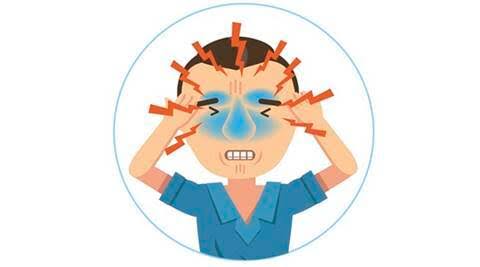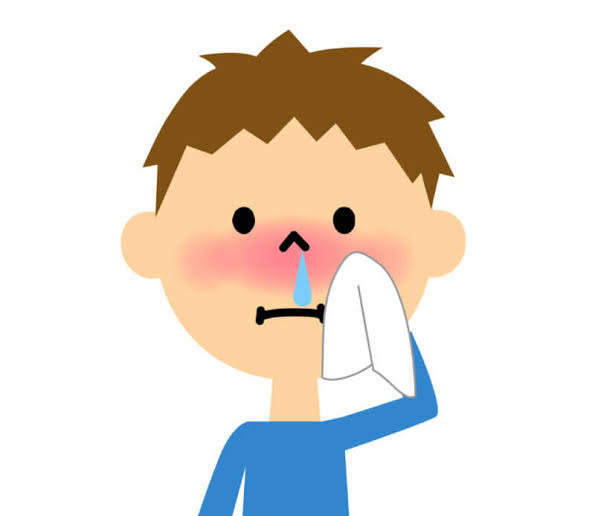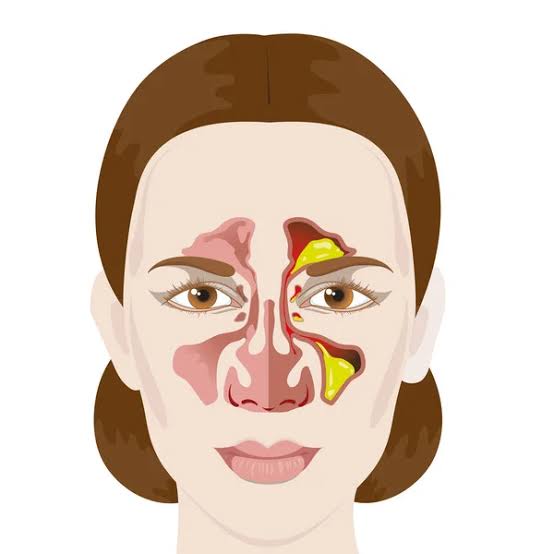Millions of individuals worldwide are afflicted with sinusitis, also commonly known as a sinus infection. The swelling and inflammation of the sinus cavities, which are found in the face bones around the nose, is what causes this illness. The mucus produced by these sinuses serves to lubricate the nasal passages and filters the air we breathe. Understanding the pathogenesis and kinds of sinusitis is important since it can cause a variety of painful symptoms when it manifests.

Unmasking the Pathology of Sinusitis
The inflammation of the sinus cavities is central to the pathogenesis of sinusitis. This inflammation can be produced by a multitude of reasons, such as infections, allergies, or environmental irritants. The mucous membranes lining the sinuses enlarge during an inflammatory episode, trapping mucus and occasionally resulting in a bacterial or viral infection. The majority of people identify sinusitis with the pressure and discomfort that results.
The Types of Sinusitis
There are various forms of sinusitis, and each has distinct characteristics:
1. Acute Sinusitis: Often brought on by viral illnesses such as the common cold, this is a transient inflammation of the sinuses.
2. Subacute Sinusitis: This kind usually lasts four to twelve weeks, longer than acute sinusitis.
3. Chronic Sinusitis: This type of sinusitis lasts more than 12 weeks and can be brought on by a fungal or bacterial infection.
4. Recurrent Sinusitis: This illness is characterized by recurrent episodes of acute sinusitis that occur all year long.
The Stages of Sinusitis
Sinusitis can advance via different phases:
1. Inflammation: The first phase, marked by sinus membrane enlargement.
2. Infection: A bacterial or viral infection may develop from inflammation if it is not addressed.
3. Chronicity: Chronic sinusitis can result from persistent infection and inflammation.
Effective management and treatment of sinusitis depend on your ability to identify the kind and stage of the condition.
Causes of Sinusitis
A variety of things can cause sinusitis, such as:
1. Viral Infections: Acute sinusitis is frequently caused by the common cold and influenza.
2. Bacterial Infections: These infections can arise on their own or as a result of a viral illness.
3. Allergies: Allergic reactions to pollen, dust mites, or pet dander can lead to sinus inflammation.
4. Environmental Irritants: Chemical irritants, smoke, and pollution can all aggravate sinusitis.
Risk Factors of Sinusitis
There are multiple risk factors that can make you more susceptible to sinusitis:
1. Allergies: People who suffer from allergies are more likely to have sinusitis.
2. Nasal Abnormalities: Polyps or deviated septums can block the nasal passages, causing sinus issues.
3. Weakness in the Immune System: An impaired immune system may find it difficult to fight off illnesses.
4. Respiratory Infections: Having respiratory infections frequently increases your risk of developing sinusitis.
You can prevent sinusitis and better control its symptoms by determining the underlying causes and risk factors.
Signs and Symptoms of Sinusitis
Sinusitis appears with a spectrum of painful symptoms that can vary in severity. Typical indications and manifestations include of:
1. Facial Pressure and Pain: This is frequently felt in the cheek, nose, and eye areas.
2. Nasal Congestion: An accumulation of mucus that makes it difficult to breathe through the nose.
3. Discolored Mucus: An infection is indicated by thick, green, or yellow mucus.
4. Headache: People frequently describe sinus headaches as a sharp, deep discomfort.
5. Fatigue: Having sinusitis can make you feel exhausted and lethargic.
6. Coughing: A chronic cough may result from postnasal drip.
7. Sore Throat: The sinuses’ discharge might irritate the throat.
8. Bad Breath: Infected mucus can cause foul-smelling breath.
By being aware of these symptoms, you can determine whether sinusitis is the cause of your symptoms and seek the right treatment.
Investigations of Sinusitis
A mix of clinical assessment and diagnostic testing is usually used to diagnose sinusitis. Your medical professional might:
1. Get a Medical History: Talk about your symptoms, how long they have lasted, and any pertinent medical background.
2. Physical Examination: A comprehensive assessment of the face and nasal passages to check for infection and inflammation.
3. Imaging: To confirm the diagnosis and ascertain the severity of the ailment, precise images of the sinuses can be obtained by X-rays or CT scans.
4. Nasal Endoscopy: To get a closer look, a flexible tube fitted with a camera may be placed inside the nasal passages.
Differential Diagnosis for Sinusitis
It is critical to distinguish sinusitis from other illnesses that could present with same symptoms. These circumstances could consist of:
1. Migraines: These headaches can be extremely painful and cause facial agony.
2. Dental Issues: Infections or impacted teeth are two examples of dental issues that might result in facial pain.
3. Rhinitis: Allergies can cause nasal congestion and postnasal drip.
4. Temporomandibular Joint (TMJ) Disorders: Pain in the jaw and face may be caused by TMJ problems.
You can get the best care by correctly diagnosing sinusitis and ruling out other illnesses.
Managing Sinusitis with Homeopathy
Traditionally, decongestants, antibiotics, and painkillers are used to treat sinusitis. Nonetheless, a lot of people look for complementary therapies like homeopathy to treat their illness. Homeopathy is a comprehensive medical approach that addresses the patient’s physical, emotional, and mental health issues.
Benefits of Homeopathy in Treating Sinusitis
The goal of homeopathic treatments for sinusitis is to encourage the body’s natural healing processes. Here are a few main advantages of treating sinusitis using homeopathy:
1. Tailored Approach: Homeopathy takes into account the individual’s particular symptoms and constitution, guaranteeing a tailored course of therapy.
2. Very Low Risk of Negative Effects: Homeopathic medicines are extremely diluted, generally harmless, and have very little chance of negative effects.
3. Addresses Root Causes: Homeopathy aims to treat immune system deficiencies or allergies as the underlying causes of sinusitis.
4. Supports Overall Well-being: Homeopathic remedies help balance mental and emotional aspects in addition to addressing physical ailments, therefore fostering a sense of well-being.
5. Management of Chronic Sinusitis: Homeopathy can be especially helpful in cases of chronic sinusitis, where traditional treatments might not be sufficient.
Homeopathic Remedies for Sinusitis
1. Kali Bichromicum: Take three to five pills three times a day for sinusitis with thick, greenish-yellow discharge and pressure at the root of the nose.
2. Silicea Terra: Effective for sinusitis that starts at the occiput and spreads over the head, especially when sensitive nasal bones are implicated; taken in 3-5 pills, 3 times a day.
3. Hydrastis Canadensis: Take 10 drops in half a glass of water three times a day for sinusitis that is accompanied by constipation, thick, persistent nasal secretions, and dull frontal ache.
4. Belladonna: 3-5 pills, three times a day; helpful for sinusitis with frontal headache, congestion, light sensitivity, and congestion in frontal and maxillary sinuses.
5. Pulsatilla Nigricans: Take three to five pills three times a day for effective relief from frontal and supraorbital pain, loss of smell, and yellow mucus with copious morning discharge.
6. Lemna Minor: Take three to five pills, three times a day, for sinusitis with nasal polyps, a foul odor, and crusts with copious discharge.
By treating the underlying reasons and unique constitution of each patient, in addition to the physical symptoms, these homeopathic remedies provide a comprehensive approach to treating sinusitis. Always consult with a certified homeopathic practitioner for individualized treatment.
While homeopathy may be helpful in treating sinusitis, it is important to speak with a trained homeopathic practitioner to receive a customized treatment plan for your particular case.
Preventing Sinusitis – Your Path to Wellness
Maintaining proper cleanliness and adopting lifestyle decisions that lower your chance of contracting the illness are key components of sinusitis prevention. The following are some broad preventative techniques:
1. Maintain Good Nasal Hygiene: Use saline nasal sprays or rinses to keep your nasal passages moist and clean.
2. Manage Allergies: If you have allergies, take steps to reduce exposure to allergens and investigate allergy medications.
3. Remain Hydrated: To keep mucus thin and avoid congestion, drink lots of water.
4. Prevent Irritants: Reduce your exposure to pollutants, smoke, and other irritants in the surroundings.
5. Wash Your Hands: Maintaining proper hand hygiene will lower the chance of sinusitis-causing infections.
6. Boost Immunity: You may fortify your immune system by leading a healthy lifestyle that includes a balanced diet, frequent exercise, and enough sleep.

Sinusitis – A Sneaky Culprit of Discomfort
Sinusitis can be a tough ailment to manage, but with the right knowledge, understanding its causes and symptoms can help you seek suitable therapy. Homeopathy offers an alternative method that takes the patient as a whole and tries to address the underlying reasons of sinusitis, even while conventional therapies are beneficial.
You may lessen your chance of getting sinusitis and live a pain-free life by adopting preventive measures into your everyday routine. Always seek advice from a homeopath or medical professional to identify the best course of action for your particular situation.
Making well-informed decisions and taking a comprehensive approach to your health are the first steps on your path to sinusitis relief and general wellness.
Reach out to us for a Consultation.
This blog is for information purposes. It’s crucial to note that while homeopathy is a centuries-old practice with many adherents worldwide, always consult a qualified homeopath or medical professional before initiating any treatment.
For any queries, reach out to us at contact@homeopathic.ai





